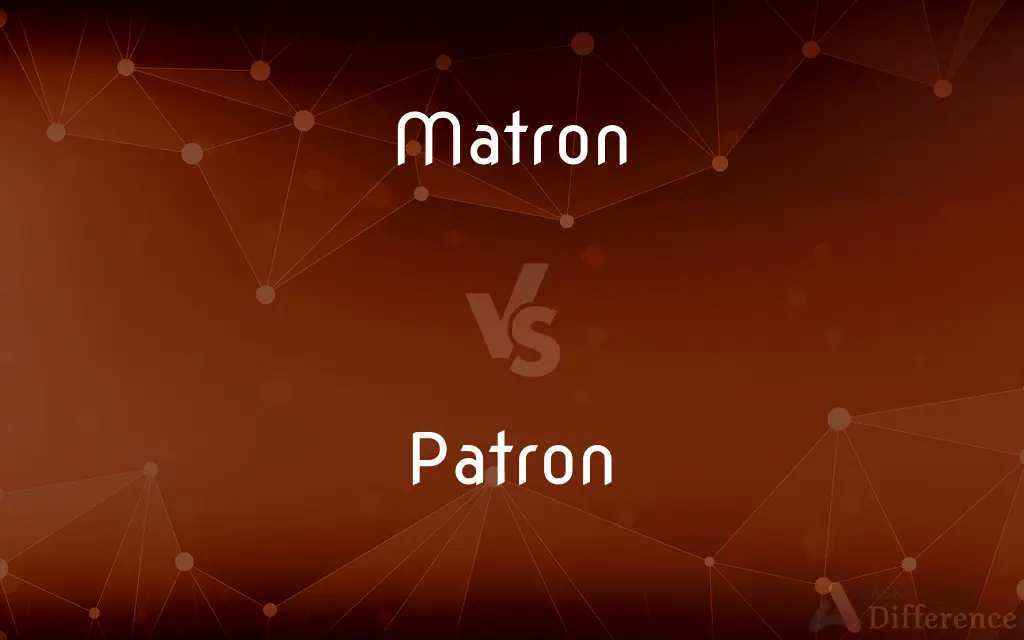Matron vs. Patron — What's the Difference?
By Tayyaba Rehman & Maham Liaqat — Updated on April 18, 2024
Matron typically refers to a female authority figure, often in a caregiving or domestic context, while a patron is someone who supports an artist, institution, or cause financially or morally.

Difference Between Matron and Patron
Table of Contents
ADVERTISEMENT
Key Differences
A matron is often associated with a senior, supervisory role in institutions such as schools and hospitals, where she may oversee operations and welfare. On the other hand, a patron usually refers to an individual or entity that provides financial or moral support to artists, museums, or cultural and humanitarian efforts.
In historical contexts, a matron was traditionally seen as a married woman or a widow who held a position of considerable respect and authority. Whereas, a patron, derived from Latin 'patronus', signifies a protector or benefactor, a role that has evolved but retains its foundational sense of support and sponsorship.
The term matron carries a nurturing and caring connotation, reflecting roles that involve direct oversight of care and administrative duties. Conversely, a patron may not have direct involvement but contributes by enabling activities through funding or advocacy.
In literary and cultural discussions, a matron is often portrayed as a figure of stability and domestic management, emphasizing traditional roles. In contrast, patrons are depicted as influential figures who enable creative and cultural pursuits, emphasizing their role in the arts and education.
The usage of matron has seen a decline in some modern contexts, being replaced by titles like 'senior nurse' or 'head nurse' in medical settings. In contrast, the role of a patron remains vibrant and recognized, especially in the arts, where patrons are celebrated for their essential contributions to sustaining cultural heritage.
ADVERTISEMENT
Comparison Chart
Definition
A woman in charge of domestic or medical arrangements.
A supporter or sponsor of an artist, cause, or institution.
Connotation
Caregiving, supervisory, nurturing.
Supportive, enabling, influential.
Typical Context
Hospitals, schools, prisons.
Arts, cultural institutions, charities.
Historical Usage
Married or authoritative women in supervisory roles.
Benefactors or protectors in various fields.
Modern Relevance
Often replaced by more specific job titles in healthcare.
Remains a prestigious and recognized role in society.
Compare with Definitions
Matron
Historically, a woman in charge of female prisoners.
The matron searched cells for contraband items.
Patron
A customer, especially a regular one, of a store, restaurant, etc.
She was a well-known patron of the cafe.
Matron
A senior nurse in a hospital or other institution.
The matron ensured all wards were properly staffed.
Patron
A sponsor or promoter of a play, broadcast, or event.
The festival was supported by several prominent patrons.
Matron
A respectful term for an older married woman.
The community looked up to her as a matron of virtue.
Patron
A person who gives financial or other support to a person, organization, or cause.
He became a patron of the local art gallery.
Matron
A matron of honor at a wedding.
Her sister served as the matron of honor.
Patron
A guardian saint of a particular group or place.
Saint Christopher is the patron of travelers.
Matron
A female manager of domestic affairs in an institution.
As the school matron, she was responsible for student welfare.
Patron
In ancient Rome, a protector of clients, slaves, or freedmen.
The wealthy senator was a patron to many.
Matron
Matron is the job title of a very senior or the chief nurse in several countries, including the United Kingdom, its former colonies, such as India, and also the Republic of Ireland. The chief nurse, in other words the person in charge of nursing in a hospital and the head of the nursing staff, is also known as the senior nursing officer, matron, nursing officer, or clinical nurse manager in UK English; the head nurse or director of nursing in US English, and the nursing superintendent or matron in Indian English, among other countries in the Commonwealth of Nations.In the United Kingdom, matrons today "have powers over budgets, catering and cleaning as well as being in charge of nurses" and "have the powers to withhold payments from catering and cleaning services if they don't think they are giving the best service to the NHS." Historically, matrons supervised the hospital as a whole but today, they are in-charge of supervising two or three wards.The chief nurse is a registered nurse who supervises the care of all the patients at a health care facility.
Patron
A person who gives financial or other support to a person, organization, or cause
A celebrated patron of the arts
Matron
A married woman or a widow, especially a mother of dignity, mature age, and established social position.
Patron
A customer of a shop, restaurant, etc., especially a regular one
We surveyed the plushness of the hotel and its sleek, well-dressed patrons
Matron
A woman who acts as a supervisor or monitor in a public institution, such as a school, hospital, or prison.
Patron
A patrician in relation to a client.
Matron
A mature or elderly woman.
Patron
A person or institution with the right to grant a benefice to a member of the clergy.
Matron
A wife or a widow, especially, one who has borne children.
Patron
One that supports, protects, or champions someone or something, such as an institution, event, or cause; a sponsor or benefactor
A patron of the arts.
Matron
A woman of staid or motherly manners.
Patron
A customer, especially a regular customer.
Matron
A housekeeper, especially, a woman who manages the domestic economy of a public institution.
Patron
(also pä-trōn) The owner or manager of an establishment, especially a restaurant or an inn of France or Spain.
Matron
A senior female nurse in an establishment, especially a hospital or school.
The matron of a school or hospital
Patron
A noble or wealthy person in ancient Rome who granted favor and protection to someone in exchange for certain services.
Matron
(US) A female prison officer.
Patron
A slave owner in ancient Rome who freed a slave without relinquishing all legal claim to him.
Matron
A wife or a widow, especially, one who has borne children; a woman of staid or motherly manners.
Your wives, your daughters,Your matrons, and your maids.
Grave from her cradle, insomuch that she was a matron before she was a mother.
Patron
One who possesses the right to grant an ecclesiastical benefice to a member of the clergy.
Matron
A housekeeper; esp., a woman who manages the domestic economy of a public instution; a head nurse in a hospital; as, the matron of a school or hospital.
Patron
A patron saint.
Matron
A married woman (usually middle-aged with children) who is staid and dignified
Patron
One who protects or supports; a defender or advocate.
Matron
A wardress in a prison
Patron
A guardian or intercessor; patron saint.
St. Joseph is the patron of many different places.
Matron
A woman in charge of nursing in a medical institution
Patron
An influential, wealthy person who supported an artist, craftsman, a scholar or a noble.
Patron
A customer, as of a certain store or restaurant.
This car park is for patrons only.
Patron
A protector of a dependent, especially a master who had freed a slave but still retained some paternal rights.
Patron
One who has gift and disposition of a benefice.
Patron
(nautical) A padrone.
Patron
A property owner, a landlord, a master. patroon.}}
Patron
To be a patron of; to patronize; to favour.
Patron
To treat as a patron.
Patron
One who protects, supports, or countenances; a defender.
Patron
A master who had freed his slave, but still retained some paternal rights over him.
Let him who works the client wrongBeware the patron's ire.
Patron
One who encourages or helps a person, a cause, or a work; a furtherer; a promoter; as, a patron of art.
Patron
One who has gift and disposition of a benefice.
Patron
A guardian saint. - called also patron saint.
Patron
See Padrone, 2.
Patron
To be a patron of; to patronize; to favor.
Patron
Doing the duty of a patron; giving aid or protection; tutelary.
Patron
A regular customer
Patron
The proprietor of an inn
Patron
Someone who supports or champions something
Common Curiosities
Are patrons typically individuals or can organizations also serve as patrons?
Both individuals and organizations, such as corporations or foundations, can act as patrons by providing financial support or sponsorships.
Does the role of a matron exist outside of healthcare settings?
Yes, the term can also apply in educational settings like boarding schools, and historically in prisons and other institutions.
What is the historical significance of a patron in the arts?
Historically, patrons played a crucial role in the arts by funding artists and projects, enabling many famous works to be created.
What qualifications are required to become a matron in a hospital?
Typically, a matron needs to be a registered nurse with considerable experience and often additional management qualifications.
What is the difference between a patron and a sponsor?
A patron generally supports for personal or altruistic reasons, whereas a sponsor might expect more tangible returns or advertising in exchange for support.
Can anyone be a patron to an artist or does it require special knowledge of the arts?
Anyone can become a patron; while appreciation of the arts enriches the experience, it is not a requirement for patronage.
What impact does a matron have on patient care within a hospital?
A matron influences patient care by managing staff, overseeing patient care protocols, and ensuring the highest standards of cleanliness and safety.
How does a patron benefit from supporting the arts or other causes?
Benefits include cultural enrichment, social recognition, networking opportunities, and sometimes tax deductions depending on the support’s nature.
Is the title "matron" still viewed positively, or does it have outdated connotations?
In some contexts, the title is seen as outdated and has been replaced by titles like 'head nurse' to reflect modern professional standards.
In what ways can a patron influence the direction or operation of an institution they support?
Patrons can influence through advisory roles, funding specific projects, or conditions tied to their financial support, depending on the agreements made.
How has the role of a matron evolved in modern times compared to the past?
The role has evolved from a primarily supervisory domestic position to a more formalized medical and administrative role within healthcare institutions.
What are the most common reasons for becoming a patron in the cultural sector?
Common reasons include a passion for the arts, desire to support community culture, personal enjoyment, and the social prestige associated with patronage.
Are there notable historical figures who were patrons in the arts?
Yes, figures like the Medici family, Peggy Guggenheim, and Maecenas are renowned for their significant contributions to the arts as patrons.
Does a matron have administrative duties or are they solely involved in direct care?
A matron typically has both administrative duties and a role in overseeing direct patient care, balancing managerial tasks with clinical oversight.
What are some challenges a matron faces in today's healthcare environment?
Challenges include staffing shortages, budget constraints, increasing administrative responsibilities, and maintaining high standards of care amidst rising patient demands.
Share Your Discovery

Previous Comparison
Abeyance vs. Suspension
Next Comparison
Humane vs. InhumaneAuthor Spotlight
Written by
Tayyaba RehmanTayyaba Rehman is a distinguished writer, currently serving as a primary contributor to askdifference.com. As a researcher in semantics and etymology, Tayyaba's passion for the complexity of languages and their distinctions has found a perfect home on the platform. Tayyaba delves into the intricacies of language, distinguishing between commonly confused words and phrases, thereby providing clarity for readers worldwide.
Co-written by
Maham Liaqat














































